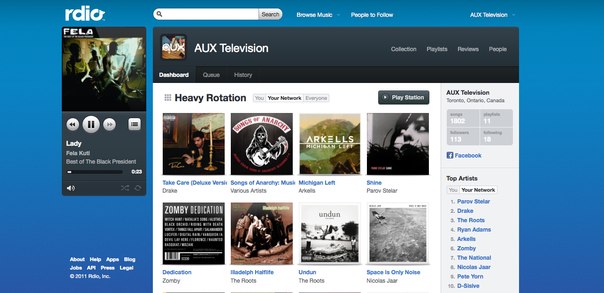 Music
Music
NICE LIST 2011: The emergence of streaming services
by Sam Sutherland
December 19, 2011
In our annual festive Naughty and Nice feature, AUX compiles the best and worst of the year in music.
Rdio. Spotify. Slacker. WiMP. Simfy. Pandora. Many of these services weren’t new in 2011, but this was the year that they all made a concerted effort to push out beyond their geek-filled base and become accepted mainstream methods of musical distribution. And it’s sort of working.
For the uninitiated, each of these websites offers their own spin on a basic concept — all the music, all the time. With a huge database of albums and singles to draw from (some admittedly better and deeper than others), each of these services allows users to tap into a colossal collection of music for a nominal monthly fee, often tossing in bonus features like offline syncing to a mobile device or native desktop applications. For everyone from ravenous musical fans to casual listeners, this is kind of game-changingly awesome, offering a fully legal way to check out the first Guided by Voices record before spinning a few songs from the latest Korn / Skrillex masterwork. It’s a universe of music that has the opportunity to replace not only the physical collection you sold when you moved all your music into your iTunes, but to even replace those cumbersome mp3 files taking up so much space on your hard drive. One push of a button recreates your entire library online, using the service’s database. That, plus every Melvins record. And everything else.
There were encouraging signs of adoption and acceptance from the industry, with labels opting to use Rdio and Spotify to premiere new albums by major artists like Evanescence and James Blake. Others, like Def Jam, Sub Pop, and Merge, began to creatively utilize the services as yet another means of interacting with music fans online. But not everyone was stoked.
In August, metal monolith Century Media pulled their entire catalogue from Spotify, citing the need to “protect the interests of their artists” along with the drop in physical sales in areas where Spotify was available. And in November, distributer STHoldings removed material from over 200 labels from all streaming services, claiming the poor revenues derived from such sites, along with their affect on sales, were exploiting music and reducing it to a free commodity. And the Black Keys made sure their recent album, future car commercial mega-hit factory El Camino, was blocked from Rdio and Spotify.
All of which is to say, it’s not perfect. The appeal of the service isn’t just the accessibility, it’s the knowledge that, unlike the stuff we grab off of Megaupload, these streaming services are, in theory, helping to support a sagging music industry that, after years of totally mishandling their business online, may finally have found a model that will help them survive.
Plus, listening to any album anywhere any time is a pretty attractive proposition, right? If the kinks of artist royalties can be ironed out so everyone is happy, this really could be the future of online music distribution.
Return to the Naughty and Nice master list.
Tags: Music, News, Evanescence, James Blake





